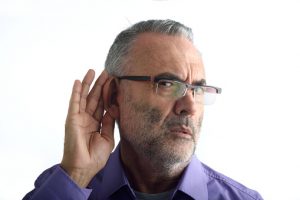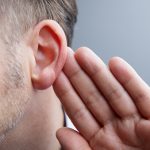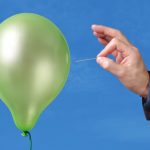 Hearing loss can be the result of a multitude of factors from common noise-induced hearing loss to the more uncommon otosclerosis hearing loss. It is estimated that 20 percent of Americans, which accounts for nearly 48 million people, will report some degree of hearing loss in our lifetime. More importantly, one in three individuals over the age of 65 has some type of hearing loss, a truly humbling statistic. The best thing you can do is to stay informed about the signs and symptoms hearing loss can present with, and the following articles will help you get started.
Hearing loss can be the result of a multitude of factors from common noise-induced hearing loss to the more uncommon otosclerosis hearing loss. It is estimated that 20 percent of Americans, which accounts for nearly 48 million people, will report some degree of hearing loss in our lifetime. More importantly, one in three individuals over the age of 65 has some type of hearing loss, a truly humbling statistic. The best thing you can do is to stay informed about the signs and symptoms hearing loss can present with, and the following articles will help you get started.
Temporary hearing loss (temporary threshold shift): Causes and treatments
There are many kinds of hearing loss and even more reasons for it occurring, and temporary hearing loss (threshold shift) is the most common of the bunch.
Advertisement
There are generally three classifications of hearing impairment; sensorineural, conductive, and mixed hearing loss. Of the three, conductive hearing loss is associated as being temporary in nature while sensorineural hearing loss tends to be more permanent, and a mix is a combination of the two.
Sensorineural hearing loss is considered to be the most severe, as it involves an abnormality or destruction of the inner structures of the ear and the auditory nerve. This may occur from birth due to genetic conditions, or viral, bacterial, or disease exposure while still in the womb. Temporary forms of sensorineural hearing loss can occur and only require time to heal. Continue reading…
 Noise-induced hearing loss (NIHL): Symptoms, causes, and prevention tips
Noise-induced hearing loss (NIHL): Symptoms, causes, and prevention tips
There are about 10 million U.S citizens living with noise-induced hearing loss. As you may have guessed, noise-induced hearing loss is impaired hearing as a result of prolonged exposure to loud noise. Sadly, a large number of NIHL cases are preventable.
We are all exposed to sound on a daily basis, including sounds from household appliances, traffic, radios, televisions, and computers. These sounds are usually harmless—however, when sounds are too loud and when that loud noise is long lasting, it can lead to permanent damage. This is because the noise damages sensitive structures in the inner ear.
Some people notice noise-induced hearing loss right away, while others find that it takes much longer to develop. There are situations where the hearing loss can be temporary, but it can also be permanent and impact both ears. Unfortunately, some people don’t realize that they are in the process of damaging their hearing. Continue reading…
 Otosclerosis (or otospongiosis) hearing loss: Symptoms, causes, and treatments
Otosclerosis (or otospongiosis) hearing loss: Symptoms, causes, and treatments
Otosclerosis—also known as otospongiosis—is a condition that affects the ears where an abnormal growth of bone forms around the stapes bone, a tiny bone in the middle of the ear. This bone is then stuck in place, and for the ear to work properly, it needs to be able to move freely. The growth also impedes on the function of the other parts of the ear, sometimes resulting in severe hearing loss.
Ears have three parts: the outer ear, the middle ear, and the inner ear. Sounds enter the outer year, where they pass through into the middle ear, causing the eardrum to vibrate. The vibrations are transmitted through ossicles—tiny bones in the ear—to the inner ear, where they move through tiny hair cells in the cochlea. The hair cells convert the sound waves into nerve impulses which then travel to the brain.
As you can see, hearing is quite a complex function. If any one step in the process is impeded, the entire process goes wrong, manifesting as partial or complete hearing loss. Continue reading…
 City noise associated with hearing loss: Study
City noise associated with hearing loss: Study
A new study has found that cities with the most noise pollution also have higher rates of hearing loss, suggesting that urban noise and hearing loss are linked. Fifty large cities were ranked based on their noise level and rate of hearing loss and it was found that high-decibel areas like New Delhi, Cairo, and Istanbul had the highest rate of hearing degradation. In comparison, cities that were rated lower on the noise level scale like Vienna, Oslo, and Munich were found to have lower rates of hearing loss.
While these results suggest that there is a connection between city noise and hearing loss, researchers assert that it does not mean that noise pollution is the main force that causes hearing degradation. Henrik Matthies, the managing director of Mimi Hearing Technologies, referred to these results as “robust” and stated: “The fact that noise pollution and hearing loss have such a tight correlation points to an intricate relationship.” Continue reading…
 Balloon popping may lead to hearing loss
Balloon popping may lead to hearing loss
Advertisement
Hearing experts from the University of Alberta have found that the effect of popping a balloon is similar to that of shooting a high-powered shotgun and could lead to hearing loss. The study, published in Canadian Audiologist, detailed how different methods of popping balloons could create different effects on an individual’s hearing, with the aim of raising awareness of how detrimental repeated exposure to loud sounds may be.
Hearing expert Bill Hodgetts of the University of Alberta explained, “Hearing loss is insidious – every loud noise that occurs has a potential for lifelong impact. We want people to be mindful of hearing damage over a lifetime, because once you get to the back end of life, no hearing aid is as good as the once healthy built-in system in your inner ear.”
Hodgetts and his colleague Dylan Scott set out to discover how loud popping a balloon could be and what damage the activity may cause. Continue reading…
